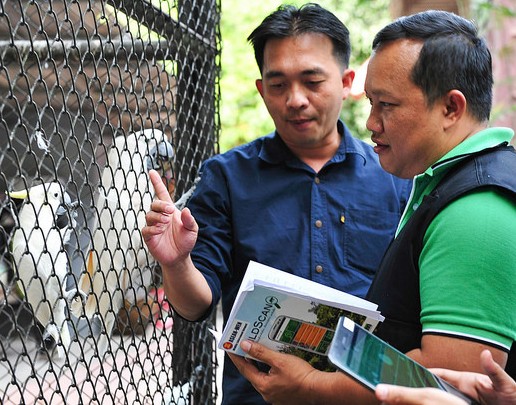
May 2016—An app developed with support from USAID is making wildlife protection officers more effective in their efforts to combat wildlife trafficking in Southeast Asia.
“Before using the WildScan application, we identified species by using photos from magazines and the news,” said Pham Tien Thinh, who works for the Forest Protection Department of Vietnam.
Many endangered animals, including birds and turtles, are smuggled with non-protected species, making timely identification difficult for authorities. Old methods of identifying species such as using large reference books were time-consuming tasks, which left far too much room for error.
WildScan, a mobile species identification and response app, is designed to help law enforcement officials respond to wildlife trafficking, an illicit trade estimated at $19 billion per year and run by organized criminal syndicates.
“The species ID library is a feature which I find most useful in the WildScan app,” said Somkiat Chanboonsai, head of the Office of Protection and Suppression Support for the Department of National Parks, Wildlife and Plant Conservation in Thailand. “Officers can use this for reference when identifying which animal is in which category so that they can also identify violations.”
As of March 2016, the app has been downloaded more than 1,000 times in at least a dozen countries. The app contains high-resolution photos of 350 protected species, clues to identify them, and tips for primary care in case they are injured. It also includes illegal wildlife products commonly trafficked into and throughout Southeast Asia to assist in proper identification and rapid response.
Chanboonsai said his officers use the application to identify uncommon species of confiscated wildlife, making it much easier to see if someone is breaking the law by possessing protected wildlife.
That was certainly the case during an arrest in the Rattanawapi district of Nong Khai province on Nov. 28, 2015, when officers confiscated 360 cobras, 10 king cobras, 39 Asian box tortoises and 125 Asian forest tortoises.
WildScan is currently available for free on Android devices and available in English, Thai and Vietnamese. The app will soon be available in Bahasa Indonesia, Bahasa Malaysia and Khmer in addition to updated Android and new Apple iOS versions.
The app is a result of a collaborative partnership between academics, law enforcement, scientists and other wildlife specialists. USAID worked through its implementing partner, Freeland, under the USAID Asia’s Regional Response to Endangered Species Trafficking program.
“Wildlife trafficking in Southeast Asia is a serious threat to biodiversity, human well-being, and feeds into transnational organized criminal networks,” said Do Quang Tung, the former chairperson of the Association of Southeast Asian Nations’ Wildlife Enforcement Network and former chief of the Convention on International Trade in Endangered Species of Wild Fauna and Flora (CITES) Management Authority of Vietnam. “This app is a game-changing approach that empowers law enforcers and the public at large across the region to work together and fight back.”
LINKS
Follow @USAIDAsia, on Facebook, on Flickr, on YouTube







Comment
Make a general inquiry or suggest an improvement.